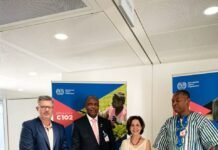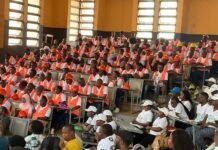By: James Samba
Guest Writer
Freetown, Sierra Leone
As we start a new decade, President Julius Maada Bio of Sierra Leone faces the daunting task of rebuilding a deteriorating economy that is beset by staggering corruption and the appointment of incompetent officials, in the past decade.
Principled leadership is required in all spheres of government to put Sierra Leone on a path of economic growth and to improve the quality of governance.
The past decade was dominated by a great deal of lip service rather than instituting practical measures to mitigate and work towards solving the issues facing the country.
On the 28th of February 2019, the government of President Julius Maada Bio launched the Medium-Term National Development Plan (MTNDP) to promote sustainable economic growth and transformation and chart the way forward to become a middle income country by 2035.
The MTNDP emphasizes human capital development, education, health and agriculture. This document is the country’s development blueprint, outlining eight clusters of a result-based pathway.
This plan received local and worldwide commendations, principally for its people-focused strategy, laced with sincerity of purpose, which are the hallmarks of good governance.
The MTNDP has four goals with eight clusters and 48 sub-clusters, aimed at addressing issues around social and macroeconomic development, human capital development, diversifying the economy and promoting growth, infrastructure and economic competitiveness, governance and accountability, empowering women, children and people with disabilities, youth employment, sports, migration, addressing vulnerabilities and building resilience and plan implementation.
During the launch of the MTNDP, the President emphatically stated that there was the need for a comprehensive blueprint to promote sustainable long-term development, and was consistent with global targets, especially the Sustainable Development Goals SDGs and the African 2063 agenda.
“I have continuously emphasized and insisted on governance inclusive and purposeful planning for quality service delivery. This plan will help us coordinate all available resources. Our future annual budgets will be fully aligned to this development plan, said President Bio. The process of developing a development plan should be owned and driven by citizens in an inclusive, consultative and participatory manner in a domesticated way in line with the national context”.
The Ministry of Planning and Economic Development (MOPED), under the leadership of Minister – Dr. Francis Kai-Kai, has been pivotal in beginning the process of popularizing and decentralizing the MTNDP with the central objective of enabling district stakeholders and grassroots understand the basics of the plan, define community priorities within the national plan to support in the next 2 to 3 years, and to also enable them become aware of their lead role in the implementation of programs and projects informed by the national plan.
On the 17th of October 2019, in Kambia District, the Ministry kicked off this process of popularizing, decentralizing and promoting local community ownership of the Plan nationwide. The aim is for the effective implementation of the New Direction’s development targets in every district.
The day’s event was dedicated to presenting and explaining the MTNDP to district stakeholders and get them understand the plan, explaining their understanding of the plan and their roles and responsibilities in its implementation as well as selecting 2 to 3 priorities for the next 2 years.
This process, among other things, revolves around the notion of putting the people at the centre of decision making, and an inclusive government based on the spirit of ‘leaving no one behind’. It also corroborates State presence, where Ministers, MPs and other state functionaries engaged the people and give updates on their work within their various sectors of government. As a result, the people are continually engaged in every planning process of the country, which makes the MTNDP, a living plan.
In Bombali District, where the process ended for the provinces, Dr. Francis Kai-Kai, the Minister, continued to re-echo his message, as done in all the other districts visited that the people should be brought along the development journey. He emphasized that ownership of the plan is critical to the development of the country and that the plan belongs to the people. Therefore, the people of Sierra Leone must own it.
On implementation, he noted that this is the responsibility of everyone, including government (MDAs) and the councils, development partners, NGOs, CSOs and the private sector who are crucial in implementing the MTNDP.
The other point was on coordination of implementation, this he said must be enforced by the chairpersons of local and district councils, who must ensure that everyone is on the table to know exactly who does what and where in the districts.
Monitoring of implementation, according to the Minister is a key factor in the effective implementation of the plan. He cited the central government, led by the National Monitoring and Evaluation Department (NaMED), the Members of Parliament, the MDA’s, Paramount Chiefs, and the people to lead this process.
The MTNDP envisages a growing economy that is responsive to the demand of a fast-changing world, an economy that does not benefit only the few but the many.
President Bio continues to take stringent measures to repair investor confidence, including improving institutional stability, restoring the credibility of the justice system and demonstrating that the state has the political will to turn the country’s finances around. More importantly, the need to embrace the MTNDP must be given a bigger stake by the people of Sierra Leone. The transfer of ownership and control of the plan to the people must be accelerated.






























